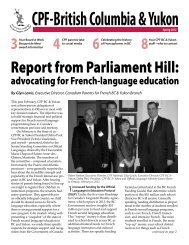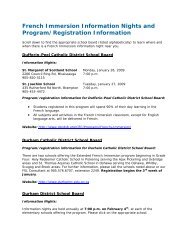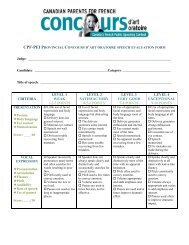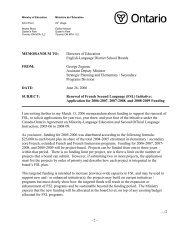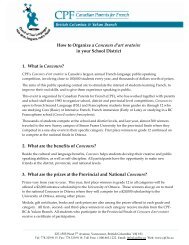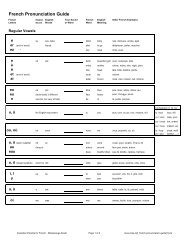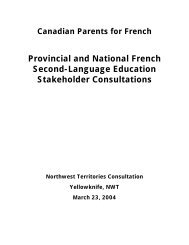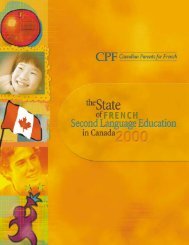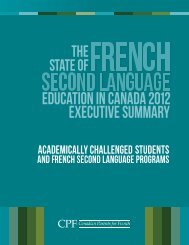Learning Assistance - Canadian Parents for French
Learning Assistance - Canadian Parents for French
Learning Assistance - Canadian Parents for French
You also want an ePaper? Increase the reach of your titles
YUMPU automatically turns print PDFs into web optimized ePapers that Google loves.
<strong>Learning</strong> <strong>Assistance</strong><strong>for</strong> <strong>French</strong>-Second-Language Studentswith <strong>Learning</strong> Disabilitiesin British Columbia
1 • <strong>Learning</strong> <strong>Assistance</strong> <strong>for</strong> FSL students with <strong>Learning</strong> Disabilities in BCIntroduction<strong>French</strong> Immersion is a very popular program inwhich parents enroll their children to learn <strong>French</strong>as a second—sometimes even third or fourth—language. In fact, enrollment in the <strong>French</strong> Immersionprogram in British Columbia has increased <strong>for</strong>14 years consecutively 1 . As such, accessibility tothe program has become an issue of increasing concernover the years, particularly due to reports ofparents with children who have learning disabilitiesbeing discouraged from registering or being urgedto withdraw their children from the highly popularand successful program.Such actions stem from the common misconceptionof parents and school administrators that Early<strong>French</strong> Immersion and Late <strong>French</strong> Immersion aretypes of “enrichment programs”—that is, programsthat are geared towards academically highachievingstudents. However, there are no admissioncriteria <strong>for</strong> entry into FSL programs. FSL programswere conceived with the belief that all nonfrancophonestudents in Canada should have equalopportunities to learn both of Canada’s official languagesand become bilingual—this includes studentswith learning disabilities. Un<strong>for</strong>tunately,DefinitionsThere is a difference between a learning disabilityand a learning challenge:According to HealthLink BC, learning challengesare cause by problems with seeing, hearing,or moving 3 . <strong>Learning</strong> disabilities, on the otherhand, are more cognitive than physical in nature;experts believe that learning disabilitiesare due to the child’s brain using and processingin<strong>for</strong>mation in a different way, whichcauses children to have trouble in listening,speaking, reading, writing, spelling, or doingthere have been reports of a limited availability—sometimes unavailability—of learning support services<strong>for</strong> these students 2 .This report aims to present the state of learning assistance<strong>for</strong> students in FSL programs in BC andstress the importance of equitable access to an educationthat promotes bilingualism, a major asset intoday’s work and recreational field. This report alsoprovides a brief overview of research regarding thecompatibility of <strong>French</strong>-Second-Language learning<strong>for</strong> learning disabled students and research done inthe area of learning support <strong>for</strong> these students. Bestpractices currently in place in school districts arehighlighted to suggest their implementation inschool districts/schools in which assistance <strong>for</strong> FSLstudents is absent or limited. Policy suggestionsand strategies <strong>for</strong> improving the state of assistancein FSL programs can be found at the end of the report,which also includes tips and references <strong>for</strong> parentsand educators who have students with learningdisabilities.1 BC Ministry of Education, http://www.bced.gov.bc.ca/reports/pdfs/student_stats/prov.pdf2 Callie Mady & Katy Arnett, Inclusion in <strong>French</strong> Immersion in Canada: OneParent’s Perspectivemath. For more in<strong>for</strong>mation on learning disabilities,their causes, their signs, treatment, andsteps parents should take if they have a childwith a learning disability, please visit Health-Link BC’s website: www.healthlinkbc.ca.This report deals with services <strong>for</strong> students withlearning disabilities that fall under the followingMinistry of Education-defined categories 4 :Moderate to Profound Intellectual Disabled (C)Autism Spectrum Disorder (G)
<strong>Learning</strong> <strong>Assistance</strong> <strong>for</strong> FSL students with <strong>Learning</strong> Disabilities in BC • 2Definitions (cont.)Mild Intellectual Disability (K)<strong>Learning</strong> Disability (Q)This report is also applicable to students who aresaid to be ‘at-risk’—that is, students who are not yetofficially designated as learning disabled, but whoshow signs of possible future low levels of academicability or language or reading impairments.What Research Has Shown So FarSome school administrators recommend parentswhose child is learning-disabled transfer their childfrom the <strong>French</strong> Immersion program to a regularEnglish-only curriculum. The main rationale is thatthe child’s learning disability combined with <strong>French</strong>Immersion would further hinder his or her progressor per<strong>for</strong>mance in English and other subject areas,as compared to if the child were to be put in an English-onlyprogram.However, it has been shown that students with below-averageacademic ability and language impairmentin <strong>French</strong> Immersion per<strong>for</strong>m equally as wellas their below-average peers in the English programin almost all subject areas 6 . In fact, the only differencein academic per<strong>for</strong>mance is in <strong>French</strong> languageacquisition: below-average <strong>French</strong> Immersion studentshave significantly superior <strong>French</strong> languageproficiency than below-average students in the Englishprogram where <strong>French</strong> is only taught as a subject.In other words, going through the curriculumin an immersion setting does not hinder their academicper<strong>for</strong>mance at all and in fact presents themwith a net benefit—that being an enhanced competencein <strong>French</strong>.Another study showed that the reading comprehensionskills and strategies of learning-disabled (and at-risk) students who were initially in an English-onlyprogram and subsequently registered into theIt should be noted that students with “specialneeds,” although they do include those with learningdisabilities, also encompass children that are“gifted” 5 . As such, the term “special needs” will notbe used in this report.3 HealthLink BC, http://www.healthlinkbc.ca/kb/content/special/abl1797.html4 BC Ministry of Education, http://www.bced.gov.bc.ca/policy/policies/_needs.htm5 School Act, BC Ministry of Education, http://www.bced.gov.bc.ca/legislation/schoollaw/e/m150-89.pdf<strong>French</strong> Immersion program actually improved 7 .Furthermore, research has found that transferring astudent struggling in <strong>French</strong> Immersion to an Englishprogram due to learning disabilities might actuallybe detrimental to the student’s education/learning, in that it could harm the child’s selfesteem8 .Research has noted that there have been reports ofparents who state that their child’s academic per<strong>for</strong>mance,and thus their psychological well-being andconfidence, improved after transferring them fromthe <strong>French</strong> Immersion program to the regular Englishprogram. However, researchers speculate that itis the additional support services provided in Englishthat benefitted the students, not the transfer tothe English program per se 6 .Early predictions of a child’s <strong>French</strong> reading abilityin later elementary years, e.g. grade 3, is in fact possiblein kindergarten by testing the child’s firstlanguagecapabilities (e.g. English). This is becauseresearch demonstrates that reading acquisition involvesa great amount of cross-linguistic transfer.As such, reading skills such as print awareness, letter-soundknowledge, phonological awareness, decodingskills, vocabulary, and background-culturalknowledge do transfer from the first language to thesecond 6 .6 Fred Genesee, <strong>French</strong> Immersion and At-Risk Students: A Review of Research des élèves en lectureEvidence8 Margaret Bruck, The Suitability of Early <strong>French</strong> Immersion Programs <strong>for</strong> the7 Renée Bourgoin, De l’anglais à l’immersion française 3e année: Les experiences Language-Disabled Child
3 • <strong>Learning</strong> <strong>Assistance</strong> <strong>for</strong> FSL students with <strong>Learning</strong> Disabilities in BCThe Current State of Availability of <strong>Learning</strong> Support Services <strong>for</strong> FSLStudentsRegarding <strong>Learning</strong> Resources and Pupil Services, the BC Ministry of Education states that:“Having implemented an immersion program, school districts should provide equitable learning resources,library books and student services in the same manner they are provided <strong>for</strong> in regular English programs.”981%of school districts reported thatmany parents, teachers, and/orschool administrators think that <strong>French</strong> Immersionis not suitable <strong>for</strong> any students with learningdisabilities.95%of school districts have studentswith learning disabilities in<strong>French</strong> Immersion. One school district reportedthat they almost never have a learning disabledstudent in FI.32%of school district administratorscontacted would recommend studentswith learning disabilities transfer out of the<strong>French</strong> Immersion program. Four of these administratorsstate that a language-based disabilityspecifically would justify a transfer.15%Some school district contacts donot know what the extent of theneed <strong>for</strong> support staff <strong>for</strong> <strong>French</strong> Immersion studentsis because their district does not differentiatebetween students in the regular English programand students in the FI program.100%of school districts recommendthe need <strong>for</strong> more researchspecific to <strong>French</strong> Immersion students, asthere is relatively much more research regardinglearning disabled students in the regular Englishprogram.81%of school districts reported thatthere have been students whotransferred out of the <strong>French</strong> Immersion programdue to their learning disabilities and/or lack ofservices <strong>for</strong> them. Three school districts did notrespond to this question or did not know the answer.One school district reported no attritiondue to learning disabilities.38%of school districts reported thattheir <strong>French</strong> Immersion teachersdo not feel confident or prepared to teach learningdisabled students. The remaining school districtcontacts are unsure of how their <strong>French</strong> Immersionteachers feel.81%of school districts have atleast one staff member thatprovides support to <strong>French</strong> Immersion studentsin the language of instruction, i.e.<strong>French</strong>. Their availabilities range from onepart-time employee in the district to a fewfull-time employees. However, some districtsonly have support staff who are fluentin <strong>French</strong> <strong>for</strong> elementary schools, and notmiddle schools or high schools.95%of school districts would like tohave more services <strong>for</strong> FI students,since there is not enough. One school districtdoes not feel the need <strong>for</strong> these services,since they almost never have learning disabledstudents in FI.9 BC Ministry of Education, http://www.bced.gov.bc.ca/policy/policies/french_immersion.htm
<strong>Learning</strong> <strong>Assistance</strong> <strong>for</strong> FSL students with <strong>Learning</strong> Disabilities in BC • 4The Current State of Availability of <strong>Learning</strong> Support Services <strong>for</strong> FSL Students(cont.)In many school districts, school district administrators and school principals are fully aware that <strong>French</strong> Immersionis <strong>for</strong> every student, regardless of academic ability, and do make note of that at FSL in<strong>for</strong>mation sessions.However, this has not completely prevented the spread of the common misconception that <strong>French</strong> Immersionis not suitable <strong>for</strong> children with learning disabilities. This may be due to the fact that parents withchildren who are learning-disabled may not be at those <strong>French</strong> Immersion in<strong>for</strong>mation sessions in the firstplace to be in<strong>for</strong>med of the facts due to prior word-of-mouth misin<strong>for</strong>mation that <strong>French</strong> Immersion may beinappropriate <strong>for</strong> their children.It has been noted in some districts that another reason <strong>for</strong> which parents withdraw their students from FSL programsis that they are recommended to do so by some teachers. Sometimes, <strong>French</strong> Immersion teachers do notfeel entirely prepared and/or confident to teach learning disabled students and thus recommend a transfer to theregular English program. It has been expressed that it is because they are aware of more learning support servicesin English or because they simply do not feel like they have been trained to provide the learning-disabledchild with the best education possible. Another reason is that they believe that in an English milieu it is moreimportant <strong>for</strong> a child to focus on English, not realizing that children can be successful in both languages.Regarding Administrators, the Ministry of Education states that:“The administrators of immersion schools should be functionally bilingual; thisshould be a consideration when districts are seeking new administrators. Whetheror not they are bilingual, at the very least, administrators should be knowledgeableabout, and supportive of, the immersion program.” 10However, when asked about learning disabled students in <strong>French</strong> Immersion in their district, one district administratorasserted that “they try not to have any.”On the other hand, there are school districts that state on their website that <strong>French</strong> Immersion is <strong>for</strong> all students,even referring web page viewers to research and official documents that support their statement.16%of school district contacts aresure there are teachers in theirdistrict who recommend parents of learning disabledstudents switch their child into the regularEnglish program, even though district administratorsand school principals stress to parents that<strong>French</strong> Immersion is suitable <strong>for</strong> these students.16%of district contacts brought upthe following point: there needsto be a way to assess <strong>French</strong> Immersion studentsearly on, e.g. in grade 1.Of the 43 BC school districts contacted that offer <strong>French</strong> Immersion, 23 responded to requests <strong>for</strong> in<strong>for</strong>mation. Of those 23 school districts,one district withheld all in<strong>for</strong>mation regarding learning support services <strong>for</strong> <strong>French</strong> Immersion students, stating that this in<strong>for</strong>mation is confidential,and another district stated they could not assist with this research because they do not delineate between students in the regularEnglish program and students in the <strong>French</strong> Immersion program. As such, all percentages are relative to 21 school districts.10 BC Ministry of Education, http://www.bced.gov.bc.ca/policy/policies/french_immersion.htm
5 • <strong>Learning</strong> <strong>Assistance</strong> <strong>for</strong> FSL students with <strong>Learning</strong> Disabilities in BCSome Best Practices Currently in PlaceIt is encouraging to find that there are practices putinto place that encourage students with learning disabilitiesto stay in <strong>French</strong> Immersion. In highschool, the subjects that are taught in <strong>French</strong> are traditionallyacademic in nature, such as mathematics,social studies, sciences, and of course <strong>French</strong>. Inone school district, <strong>for</strong> example, Physical Educationis actually offered in <strong>French</strong>. There<strong>for</strong>e, studentswho are struggling in their academic courses canstill acquire <strong>French</strong> language proficiency in subjectsin which they per<strong>for</strong>m better—the <strong>French</strong> they learnin P.E. is of course easily applicable to everydayconversations and can even help students expressthemselves in <strong>French</strong> in other courses and thus improvetheir academic per<strong>for</strong>mance.It should be noted that the availability of learningsupport teachers, etc. <strong>for</strong> secondary <strong>French</strong> Immersionstudents was not always the case in someschool districts. For example, in one school district,this came in part as the result of a parent’s relentlesspushing and determination to get her learning disabledchild the support she needed in high school,since only the elementary schools had the muchneeded support staff. Un<strong>for</strong>tunately, many parentswith learning disabled children in <strong>French</strong> Immersionare not aware that they are entitled to supportservices in <strong>French</strong> and thus do not advocate <strong>for</strong> theneeded services when these services are not availablein their district. However, the success story ofthis parent has disseminated, spreading awarenessof this issue.In another school district, to address the issue ofteachers feeling not adequately trained to teach studentswith learning disabilities, those who cannotimmediately secure a classroom teaching job aresuggested to become Educational Assistants (EAs).There<strong>for</strong>e, when a teaching opening arises, this professionalnot only has teacher training, but specialeducation training as well.Policy Recommendations and StrategiesIf possible, non-academic subjects such asPE, Drama, etc. should be taught in<strong>French</strong>. Some assert that the vocabulary acquiredin non-academic courses could in factbe more useful in different contexts in everydayconversations than that gained fromcourses such as mathematics. Of course, thatis not to say that academic courses shouldcease to be taught in <strong>French</strong>—the opposite isasserted: the more subjects that are taught in<strong>French</strong>, the greater the student’s proficiencyin <strong>French</strong> will be. This in turn could lead to areduction in the number of students transferringout of the <strong>French</strong> Immersion program. Change brochures/pamphlets that describewhat an “ideal” FI student lookslike. Dr. Callie Mady, Researcher and Professorat the Schulich School of Educationin Ontario, addressed how language on<strong>French</strong> Immersion promotional materialsdescribing a “successful child in <strong>French</strong> Immersion”such as “strong skills in his or herfirst language, is verbal and likes to talk, hasa good memory,” etc. is not only five timesmore likely to describe females than males,but also deters parents with children havingdifficulties in school 11 .11 <strong>Canadian</strong> <strong>Parents</strong> <strong>for</strong> <strong>French</strong>, The State of <strong>French</strong> Second Language Education in Canada 2012
<strong>Learning</strong> <strong>Assistance</strong> <strong>for</strong> FSL students with <strong>Learning</strong> Disabilities in BC • 6Policy Recommendations and Strategies (cont.) Let parents know at parent in<strong>for</strong>mationsessions <strong>for</strong> students with learning disabilitiesthat <strong>French</strong> Immersion is an option.It is perhaps not enough to say that FI is <strong>for</strong>all students at FI in<strong>for</strong>mation sessions, sinceparents with learning disabled children aremost likely not at those in<strong>for</strong>mation sessionsanyway, due to the circulating myths that FIis not <strong>for</strong> struggling students. Some arguethat if there are few or no services <strong>for</strong> FI LDstudents, why should parents enrol their childrenin FI? If the numbers of LD FI childrenincrease, there would be more demand<strong>for</strong> services, which would push <strong>for</strong> more servicesin this area. Since the student populationis becoming more and more diverse,classrooms, including <strong>French</strong> Immersionones, should become more accommodatingto this diverse group of children. As it has been alluded to numerous times,some school administrators (including teachers)are not aware that FSL programs are notenrichment programs or programs specificallytailored <strong>for</strong> academically strong students.As such, (new) school administrators and<strong>French</strong> Immersion teachers should be in<strong>for</strong>medof the state of learning assistance<strong>for</strong> <strong>French</strong> Immersion students and of theresearch out there that lends heavy support<strong>for</strong> equal access to FSL programs <strong>for</strong>all students. Numbers of students with learning disabilitiesin <strong>French</strong> Immersion should betracked. It has been noted that sometimesneither the learning support staff nor the<strong>French</strong> immersion staff have data regardingthose in FI with learning disabilities. Address special education more in professionaldevelopment programs <strong>for</strong> <strong>French</strong>Immersion teachers. Although they shouldnot replace a learning support aide, the smallaccommodations teachers per<strong>for</strong>m <strong>for</strong> thestudent would make a significant difference<strong>for</strong> the student in the classroom. ResearchersDr. Callie Mady and Dr. Karty Arnettassert that “teacher education programsshould work to ensure that teachers feel preparedand supported in meeting the needs ofan increasingly diverse classroom.” 12 More research is needed on learning assistance<strong>for</strong> FSL students. Although researchso far has lent great support <strong>for</strong> FSLeducation <strong>for</strong> learning-disabled students,more studies in this area is needed in orderto determine the best ways to help thesechildren. The BC Ministry of Education should releasea publication specifically addressing<strong>French</strong> Immersion students with learningdisabilities, like the ministries of Albertaand Manitoba have done. The Alberta Educationhas at least five documents pertainingspecifically to <strong>French</strong> Immersion studentswith learning disabilities and refers to researchdone in this area. As such, educatorsand parents in Alberta may be more aware ofthis topic, since this in<strong>for</strong>mation is so easilyfound online.12 Callie Mady & Katy Arnett, A critically conscious examination of special education within FSL and its relevance to FSL teacher education programs
7 • <strong>Learning</strong> <strong>Assistance</strong> <strong>for</strong> FSL students with <strong>Learning</strong> Disabilities in BCResources <strong>for</strong> <strong>Parents</strong> and EducatorsYes, You Can Help!http://education.alberta.ca/media/3091402/yesyoucanhelp.pdfAlberta EducationInclusion in the <strong>French</strong> ImmersionProgramhttp://www.edu.gov.mb.ca/k12/docs/fr_imm_handbook/chap_9.pdfManitoba Education, Citizenship and YouthL’inclusion en Immersionhttp://education.alberta.ca/media/720116/inclusionweb.pdfAlberta EducationDiversity in <strong>French</strong> ImmersionClassrooms: A Quick Inclusion Guide <strong>for</strong>Teachershttp://www.education.alberta.ca/media/1260545/diversityfrenchimmersionnew.pdfVersion française: http://www.education.alberta.ca/media/6669522/diversiteimm.pdfAlberta EducationStrategies <strong>for</strong> Helping Underper<strong>for</strong>mingImmersion Learners SucceedDr. Katy Arnett, Dr. Tara FortuneCan <strong>French</strong> Immersion offer anappropriate quality education <strong>for</strong>students with diverse learning needs?http://education.alberta.ca/media/1260549/depliantall.pdfAlberta EducationIt’s not as hard as you think: includingstudents with learning difficulties in Core<strong>French</strong>Dr. Katy ArnettUnderstanding Language and <strong>Learning</strong>Disabilities in Immersion EducationDr. Tara Fortune, Dr. Mandy MenkePredicting Risk <strong>for</strong> Oral and WrittenLanguage <strong>Learning</strong> Difficulties inStudents Educated in a Second LanguageDr. Caroline Erdos, Dr. Fred Genesee,Dr. Robert Savage, Dr. Corinne HaighIdentification of Reading Difficulties inStudents Schooled in a Second LanguageDr. Fred Genesee, Dr. Robert Savage,Dr. Caroline Erdos, Dr. Corinne HaighAcknowledgementsCPF-BC & Yukon would like to thank Dr. FredGenesee, Dr. Wendy Carr, Dr. Callie Mady, Ms. RenéeBourgoin, Ms. Alicia Logie and school districtrepresentatives <strong>for</strong> their contributions to the research<strong>for</strong> this report.<strong>Canadian</strong> <strong>Parents</strong> <strong>for</strong> <strong>French</strong>-BC & Yukon227 - 1555 W 7th AvenueVancouver, BC V6J 1S1 CanadaTel.: (778) 329-9115Fax: 1 (888) 678-1780Toll Free: 1 (800) 665-1222www.cpf.bc.ca



